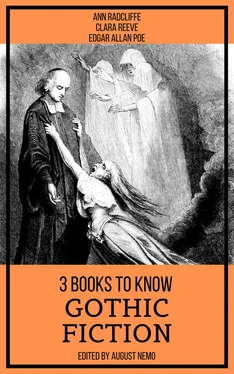This accumulation of evil subdued each power of resistance, and reduced Julia to a state little short of distraction. No person was allowed to approach her but her maid, and the servant who brought her food. Emilia, who, though shocked by Julia’s apparent want of confidence, severely sympathized in her distress, solicited to see her; but the pain of denial was so sharply aggravated by rebuke, that she dared not again to urge the request.
In the mean time Ferdinand, involved in the gloom of a dungeon, was resigned to the painful recollection of the past, and a horrid anticipation of the future. From the resentment of the marquis, whose passions were wild and terrible, and whose rank gave him an unlimited power of life and death in his own territories, Ferdinand had much to fear. Yet selfish apprehension soon yielded to a more noble sorrow. He mourned the fate of Hippolitus, and the sufferings of Julia. He could attribute the failure of their scheme only to the treachery of Robert, who had, however, met the wishes of Ferdinand with strong apparent sincerity, and generous interest in the cause of Julia. On the night of the intended elopement, he had consigned the keys to Ferdinand, who, immediately on receiving them, went to the apartment of Hippolitus. There they were detained till after the clock had struck one by a low noise, which returned at intervals, and convinced them that some part of the family was not yet retired to rest. This noise was undoubtedly occasioned by the people whom the marquis had employed to watch, and whose vigilance was too faithful to suffer the fugitives to escape. The very caution of Ferdinand defeated its purpose; for it is probable, that had he attempted to quit the castle by the common entrance, he might have escaped. The keys of the grand door, and those of the courts, remaining in the possession of Robert, the marquis was certain of the intended place of their departure; and was thus enabled to defeat their hopes at the very moment when they exulted in their success.
When the marchioness learned the fate of Hippolitus, the resentment of jealous passion yielded to emotions of pity. Revenge was satisfied, and she could now lament the sufferings of a youth whose personal charms had touched her heart as much as his virtues had disappointed her hopes. Still true to passion, and inaccessible to reason, she poured upon the defenceless Julia her anger for that calamity of which she herself was the unwilling cause. By a dextrous adaptation of her powers, she had worked upon the passions of the marquis so as to render him relentless in the pursuit of ambitious purposes, and insatiable in revenging his disappointment. But the effects of her artifices exceeded her intention in exerting them; and when she meant only to sacrifice a rival to her love, she found she had given up its object to revenge.
––––––––

THE NUPTIAL MORN, SO justly dreaded by Julia, and so impatiently awaited by the marquis, now arrived. The marriage was to be celebrated with a magnificence which demonstrated the joy it occasioned to the marquis. The castle was fitted up in a style of grandeur superior to any thing that had been before seen in it. The neighbouring nobility were invited to an entertainment which was to conclude with a splendid ball and supper, and the gates were to be thrown open to all who chose to partake of the bounty of the marquis. At an early hour the duke, attended by a numerous retinue, entered the castle. Ferdinand heard from his dungeon, where the rigour and the policy of the marquis still confined him, the loud clattering of hoofs in the courtyard above, the rolling of the carriage wheels, and all the tumultuous bustle which the entrance of the duke occasioned. He too well understood the cause of this uproar, and it awakened in him sensations resembling those which the condemned criminal feels, when his ears are assailed by the dreadful sounds that precede his execution. When he was able to think of himself, he wondered by what means the marquis would reconcile his absence to the guests. He, however, knew too well the dissipated character of the Sicilian nobility, to doubt that whatever story should be invented would be very readily believed by them; who, even if they knew the truth, would not suffer a discovery of their knowledge to interrupt the festivity which was offered them.
The marquis and marchioness received the duke in the outer hall, and conducted him to the saloon, where he partook of the refreshments prepared for him, and from thence retired to the chapel. The marquis now withdrew to lead Julia to the altar, and Emilia was ordered to attend at the door of the chapel, in which the priest and a numerous company were already assembled. The marchioness, a prey to the turbulence of succeeding passions, exulted in the near completion of her favorite scheme. — A disappointment, however, was prepared for her, which would at once crush the triumph of her malice and her pride. The marquis, on entering the prison of Julia, found it empty! His astonishment and indignation upon the discovery almost overpowered his reason. Of the servants of the castle, who were immediately summoned, he enquired concerning her escape, with a mixture of fury and sorrow which left them no opportunity to reply. They had, however, no information to give, but that her woman had not appeared during the whole morning. In the prison were found the bridal habiliments which the marchioness herself had sent on the preceding night, together with a letter addressed to Emilia, which contained the following words:
‘Adieu, dear Emilia; never more will you see your wretched sister, who flies from the cruel fate now prepared for her, certain that she can never meet one more dreadful. — In happiness or misery — in hope or despair — whatever may be your situation — still remember me with pity and affection. Dear Emilia, adieu! — You will always be the sister of my heart — may you never be the partner of my misfortunes!’
While the marquis was reading this letter, the marchioness, who supposed the delay occasioned by some opposition from Julia, flew to the apartment. By her orders all the habitable parts of the castle were explored, and she herself assisted in the search. At length the intelligence was communicated to the chapel, and the confusion became universal. The priest quitted the altar, and the company returned to the saloon.
The letter, when it was given to Emilia, excited emotions which she found it impossible to disguise, but which did not, however, protect her from a suspicion that she was concerned in the transaction, her knowledge of which this letter appeared intended to conceal.
The marquis immediately dispatched servants upon the fleetest horses of his stables, with directions to take different routs, and to scour every corner of the island in pursuit of the fugitives. When these exertions had somewhat quieted his mind, he began to consider by what means Julia could have effected her escape. She had been confined in a small room in a remote part of the castle, to which no person had been admitted but her own woman and Robert, the confidential servant of the marquis. Even Lisette had not been suffered to enter, unless accompanied by Robert, in whose room, since the night of the fatal discovery, the keys had been regularly deposited. Without them it was impossible she could have escaped: the windows of the apartment being barred and grated, and opening into an inner court, at a prodigious height from the ground. Besides, who could she depend upon for protection — or whither could she intend to fly for concealment? — The associates of her former elopement were utterly unable to assist her even with advice. Ferdinand himself a prisoner, had been deprived of any means of intercourse with her, and Hippolitus had been carried lifeless on board a vessel, which had immediately sailed for Italy.
Читать дальше













